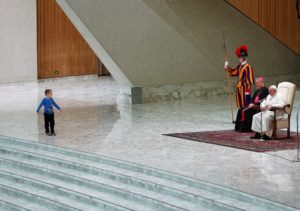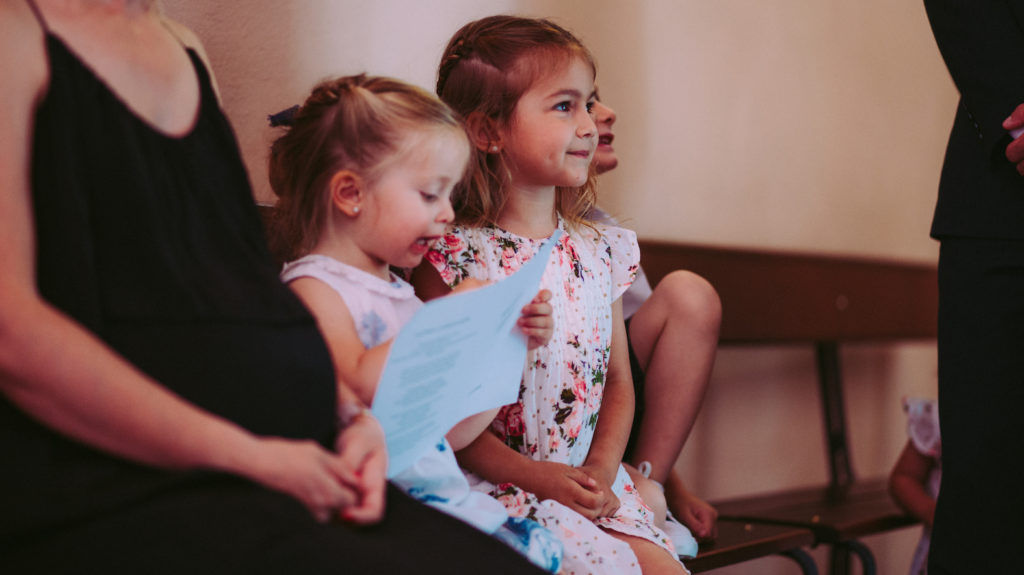Earlier this summer, my family went camping for the weekend a couple of hours away, and, as one does on vacation, found a Catholic parish with a 10 a.m. Sunday Mass. We arrived a few minutes late, and packed ourselves as quickly and quietly as we could into the second-to-last row of the church.
With six children under seven, we make some noise everywhere we go — there’s no avoiding it. Even with two sleeping babies and quiet toddlers, little humans have a hard time keeping still and tend to fidget, flip through the missals and lean over to poke their siblings. For kids who engage daily in WWE-style fighting matches and live concerts, they behaved impressively well once inside the church. But judging by the reactions of some of our fellow Massgoers, you’d have thought the kids were trying to burn the place down.
There was a single man sitting in the pew in front of us, alone, who reacted to every shift my children made, every page they turned, with obvious irritation at their existence. If his expressions and visceral response were not enough to declare his indignation at our presence, he also refused to turn around during the Sign of Peace — the universal sign of discord within the Mass. So when my autistic child started crying as we got up to receive holy Communion, I did not walk back to the pew but walked straight to the doors of the church, rather than stay around for the final blessing from the pastor and judgment from the locals.
Growing up, my parish was packed with families. The cry room was packed, yes, but so were all the other rows of the church — with children of various behaviors, coloring books, and yes, snacks. Occasionally, a child would run down the aisle with a parent in pursuit (my brothers and mother included) and no one reacted with scorn. Kids were just being kids, and nothing was wrong with that.
Things feel different nowadays, a time when more and more children are not to be heard or seen, where everyone looks at children as nuisances. Give the kid a phone so they’ll be quiet; give them an iPad so the adults can talk “in peace.” How dare you bring them into the church where it’s my time with Jesus. How dare you interrupt MY time?
Not too long ago, a friend attended a Wednesday audience with Pope Francis during a trip to Italy. He was moved to see an autistic child running down the aisle get past the Swiss Guards, all the way to the pope himself — with his sister in tow. Francis didn’t just let them sit next to him — as he spoke, he let the little boy rest his head on him.

Hours later, this friend messaged my husband and me to tell us this because the boy reminded him of my son. I was struck to think that this is the image of Christ, saying “let the children come to me.”
Let the children come to me not when they are quiet and unmoving, but when they are curious and open and free. When they believe in God with pure hearts, purer than us adults who think we know everything with our degrees and experience and wisdom.
In many ways, the Church represents the last line of defense for the family in an ailing society. Statistically, the defenses are not in great shape: According to Vatican statistics, the Church performed 2 million fewer baptisms in 2020 than in 2013, despite the world’s population increasing by 9.1%. In 2021, there were less than 100,000 new Catholic marriages in the U.S., just a third of where the figure stood less than 30 years ago. Baptisms, first Communions, and confirmations have all headed in the same direction.
It is only the Church that encourages me to be open to life, despite having two disabled children, and despite my own battle with cancer. The Church has given me role models like St. Gianna Beretta Molla and Servant of God Chiara Petrillo who have served as inspirations and intercessors for me over the past several years. But the Church here, on earth, how do we support parents in the trenches? Do we welcome parents that are struggling? Do we recognize that they are raising our future — and that if these children don’t feel welcome, they will end up lost to a culture that offers a growing list of false promises?
There are families, still. Catholics who want to have more than one child, but are afraid. Who want to pass faith to their children, but don’t know how to. How can we encourage them? How can we help them?
Children are intuitive, sensitive little people, who recognize quite quickly if they are welcome or not. My kids love our pastor — and they know that he loves them. They are comfortable with him, and by extension, they are comfortable in the Mass. If children don’t feel at home in the Church, what kind of future does she have?

